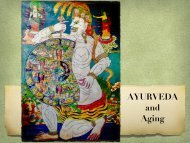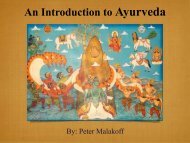How Thoreau's Walden Pond Mixed with the Ganges and Yoga Came to America with Swami Vivekananda
One early morning in 1846, during the coldest days of a New England winter, Henry David Thoreau looked out the window of his small cabin on Walden Pond and saw men cutting its ice into blocks. That ice was hauled by horse to a railroad that ran across the western edge of Walden Pond, packed into a boxcar, taken to Boston and loaded onto a clipper ship that sailed to Calcutta, India, arriving about four months later. Once there, that ice was purchased by grateful members of the East India Company. Thoreau had witnessed a small part of the global ice trade between New England and India that took place during the latter part of the nineteenth century. When Thoreau considered the ice trade, his vision sailed on metaphors far beyond the scope of business. The waters he imagined flowed both east and west and carried not just natural elements, but culture, religion and philosophy as well. He envisioned that after arriving in Calcutta, the New England ice of Walden Pond would eventually melt and run downhill where it would join with the sacred water of the Ganges. He wrote in Walden: "It appears that the sweltering inhabitants of Charleston and New Orleans, of Madras and Bombay and , drink at my well. In the morning I bathe my intellect in the stupendous and cosmogonal philosophy of the , since whose composition years of the gods have elapsed, and in comparison with which our modern world and its literature seem puny and trivial; and I doubt if that philosophy is not to be referred to a previous state of existence, so remote is its sublimity from our conceptions. I lay down the book [Bhagavad-Gita] and go to my well for water, and lo! there I meet the servant of the Bramin, priest of and and who still sits in his temple on the Ganges reading the , or dwells at the root of a tree with his crust and water jug. I meet his servant come to draw water for his master, and our buckets as it were grate together in the same well. The pure Walden water is mingled with the sacred water of the Ganges." This book tells the story of these waters . . .
One early morning in 1846, during the coldest days of a New England winter, Henry David Thoreau looked out the window of his small cabin on Walden Pond and saw men cutting its ice into blocks. That ice was hauled by horse to a railroad that ran across the western edge of Walden Pond, packed into a boxcar, taken to Boston and loaded onto a clipper ship that sailed to Calcutta, India, arriving about four months later. Once there, that ice was purchased by grateful members of the East India Company. Thoreau had witnessed a small part of the global ice trade between New England and India that took place during the latter part of the nineteenth century.
When Thoreau considered the ice trade, his vision sailed on metaphors far beyond the scope of business. The waters he imagined flowed both east and west and carried not just natural elements, but culture, religion and philosophy as well. He envisioned that after arriving in Calcutta, the New England ice of Walden Pond would eventually melt and run downhill where it would join with the sacred water of the Ganges. He wrote in Walden: "It appears that the sweltering inhabitants of Charleston and New Orleans, of Madras and Bombay and , drink at my well. In the morning I bathe my intellect in the stupendous and cosmogonal philosophy of the , since whose composition years of the gods have elapsed, and in comparison with which our modern world and its literature seem puny and trivial; and I doubt if that philosophy is not to be referred to a previous state of existence, so remote is its sublimity from our conceptions.
I lay down the book [Bhagavad-Gita] and go to my well for water, and lo! there I meet the servant of the Bramin, priest of and and who still sits in his temple on the Ganges reading the , or dwells at the root of a tree with his crust and water jug. I meet his servant come to draw water for his master, and our buckets as it were grate together in the same well. The pure Walden water is mingled with the sacred water of the Ganges."
This book tells the story of these waters . . .
Create successful ePaper yourself
Turn your PDF publications into a flip-book with our unique Google optimized e-Paper software.
Jyotish<br />
“Jyotisha is <strong>the</strong> traditional Indian system of astrology<br />
rooted in Vedic-Purānic tradition. It is<br />
often called Vedic Jyotiṣa by its practitioners<br />
<strong>and</strong> Hindu or Indian astrology by foreigners.<br />
Jyotiṣa is a Vedānga or an auxiliary text <strong>to</strong> <strong>the</strong><br />
<strong>the</strong> Veda.<br />
Jyotiṣa reasons out destiny in terms of Karma<br />
phala [fruit of actions] <strong>and</strong> its predictions are<br />
reflections of karma phalas. The shortest <strong>and</strong><br />
best definition of Jyotiṣa is 'Karma-phalavipāka-kāla-vidhānam',<br />
i.e., set of rules for timing<br />
of fruition of past actions. All actions do<br />
not bear fruits instantly. Some results may be instantaneous while o<strong>the</strong>rs may be<br />
deep <strong>and</strong> far reaching, often going beyond a single life. Jyotiṣa studies <strong>the</strong>se obscure<br />
fruits of actions which we do not even remember. Destiny or prārabdha is<br />
that part of fruits of past actions which has become dominant <strong>and</strong> has pushed<br />
o<strong>the</strong>r fruits in<strong>to</strong> background because <strong>the</strong>y do not match <strong>with</strong> <strong>the</strong> dominant<br />
group of fruits which have resulted in<strong>to</strong> one's birth in this world.<br />
Jyotiṣa is a Vedānga. The first ever record for Jyotiṣa is found in <strong>the</strong> Veda.<br />
The earliest reference <strong>to</strong> Jyotiṣa as a vedānga is found in <strong>the</strong> Mundaka Upanishad<br />
<strong>and</strong> Chāndogya Upanishada also mentions it as a distinct discipline. The<br />
first Vedic Yajna in Yajurveda is Darsha-paurnamāsa Yajna, which needed correct<br />
timing of tithis (eg, New Moon or Darsha, <strong>and</strong> Full Moon or Poornamāsa).<br />
Vedas are concerned <strong>with</strong> Yajnas which can be performed only at astrologically<br />
auspicious moments.<br />
Jyotiṣa has been referred <strong>to</strong> as <strong>the</strong> Eye of Veda, i.e., Eye of real Knowledge<br />
(Veda means real Knowledge), because Jyotisha provides <strong>the</strong> tangible proofs in<br />
favor of existence of soul <strong>and</strong> rebirth by means of horoscope in this life reflecting<br />
<strong>the</strong> karmas of past life.”<br />
—Hindupedia<br />
Vivekan<strong>and</strong>a’s teaching on Jyotish tended <strong>to</strong> be critical but must be unders<strong>to</strong>od<br />
in terms of what he is criticizing <strong>and</strong> <strong>the</strong> audience he is addressing. He<br />
said:<br />
“If you can get an explanation of a phenomenon from <strong>with</strong>in its nature, it is<br />
nonsense <strong>to</strong> look for an explanation from outside. If <strong>the</strong> world explains itself, it is<br />
nonsense <strong>to</strong> go outside for an explanation. Have you found any phenomena in<br />
<strong>the</strong> life of a man that you have ever seen which cannot be explained by <strong>the</strong><br />
power of <strong>the</strong> man himself ? So what is <strong>the</strong> use of going <strong>to</strong> <strong>the</strong> stars or anything<br />
else in <strong>the</strong> world? My own Karma is sufficient explanation of my present state.<br />
So in <strong>the</strong> case of Jesus himself. We know that his fa<strong>the</strong>r was only a carpenter. We<br />
need not go <strong>to</strong> anybody else <strong>to</strong> find an explanation of his power. He was <strong>the</strong> outcome<br />
of his own past, all of which was a preparation for that Jesus. Buddha goes<br />
back <strong>and</strong> back <strong>to</strong> animal bodies <strong>and</strong> tells us how he ultimately became Buddha.<br />
So what is <strong>the</strong> use of going <strong>to</strong> stars for explanation? They may have a little influence;<br />
but it is our duty <strong>to</strong> ignore <strong>the</strong>m ra<strong>the</strong>r than hearken <strong>to</strong> <strong>the</strong>m <strong>and</strong> make<br />
ourselves nervous. This I lay down as <strong>the</strong> first essential in all I teach: anything<br />
that brings spiritual, mental, or physical weakness, <strong>to</strong>uch it not <strong>with</strong> <strong>the</strong> <strong>to</strong>es of<br />
your feet. Religion is <strong>the</strong> manifestation of <strong>the</strong> natural strength that is in man. A<br />
spring of infinite power is coiled up <strong>and</strong> is inside this little body, <strong>and</strong> that spring<br />
is spreading itself. And as it goes on spreading, body after body is found insufficient;<br />
it throws <strong>the</strong>m off <strong>and</strong> takes higher bodies. This is <strong>the</strong> his<strong>to</strong>ry of man, of<br />
religion, civilization, or progress. That giant Prome<strong>the</strong>us, who is bound, is getting<br />
himself unbound. It is always a manifestation of strength, <strong>and</strong> all <strong>the</strong>se<br />
ideas such as astrology, although <strong>the</strong>re may be a grain of truth in <strong>the</strong>m, should<br />
be avoided.”<br />
Vivekan<strong>and</strong>a was criticizing that aspect of Jyotish that speaks of fate (Vithi)<br />
as <strong>the</strong> determining fac<strong>to</strong>r. That aspect of jyotish has grown tremendously in India<br />
<strong>to</strong> <strong>the</strong> point that people resign <strong>the</strong>mselves <strong>to</strong> <strong>the</strong>ir fate <strong>with</strong>out trying <strong>to</strong> make<br />
a change. It seems <strong>to</strong> me, it was that disposition Vivekan<strong>and</strong>a was addressing.<br />
There is ano<strong>the</strong>r aspect of jyotish: <strong>the</strong> casting light on life (jyoti means light).<br />
This light enables a person <strong>to</strong> avoid <strong>the</strong> trouble that has not yet come by a determination<br />
of <strong>the</strong> qualities of nature <strong>and</strong> ones relationship <strong>to</strong> <strong>the</strong>m. It has little difference<br />
from getting a wea<strong>the</strong>r report before going sailing across <strong>the</strong> ocean. Doing<br />
so allows you <strong>to</strong> set out on one day as opposed <strong>to</strong> a less favorable one <strong>and</strong> <strong>to</strong><br />
sail on this route instead of ano<strong>the</strong>r one.<br />
Jyotish can be interpreted in such a way that it is all about fate <strong>and</strong> that things<br />
are determined. This is <strong>the</strong> tendency among many people <strong>and</strong> especially so in India.<br />
<strong>How</strong>ever, <strong>the</strong> Indian traditions also recognize free will <strong>and</strong> a better informed<br />
person has a better field in which <strong>to</strong> operate. This does not make one weak unless<br />
one merely resigns himself <strong>to</strong> his fate.<br />
Sri Yukteswar, <strong>the</strong> Guru of Paramahamsa <strong>Yoga</strong>n<strong>and</strong>a who was himself a<br />
well-known Vedic Astrologer wrote <strong>the</strong> following:<br />
“The message boldly blazoned across <strong>the</strong> heavens at <strong>the</strong> moment of birth is<br />
not meant <strong>to</strong> emphasize fate- <strong>the</strong> result of past good <strong>and</strong> evil- but <strong>to</strong> arouse<br />
man’s will <strong>to</strong> escape from his universal thralldom. What he has done, he can<br />
undo. None o<strong>the</strong>r than himself was <strong>the</strong> instiga<strong>to</strong>r of <strong>the</strong> causes of whatever effects<br />
are now prevalent in his life. He can overcome any limitation, because he<br />
created it by his own actions in <strong>the</strong> first place, <strong>and</strong> because he has spiritual resources<br />
which are not subject <strong>to</strong> planetary pressure.”<br />
“The wise man defeats his planets. There are certain mechanical features in<br />
<strong>the</strong> law of karma which can be skillfully adjusted by <strong>the</strong> fingers of wisdom”<br />
-Sri Yukteswar<br />
Related Glossary Terms<br />
Drag related terms here<br />
Index<br />
Find Term


















